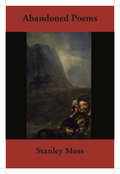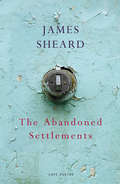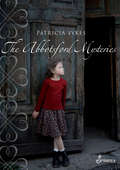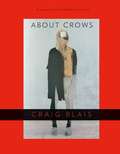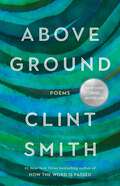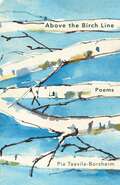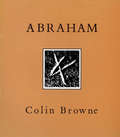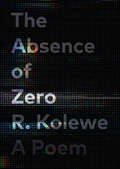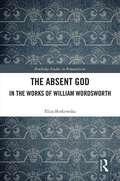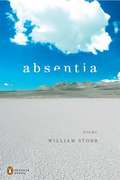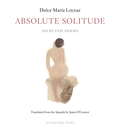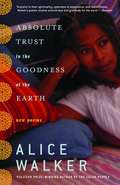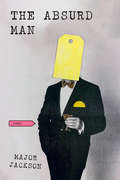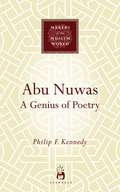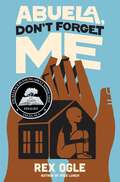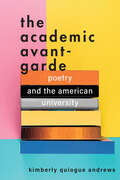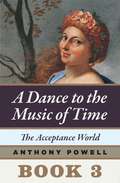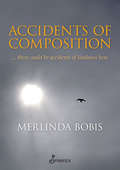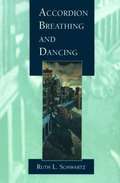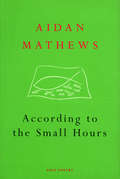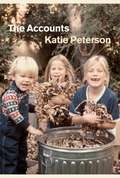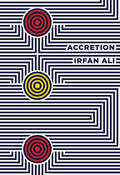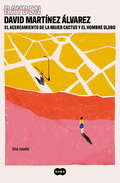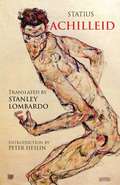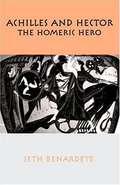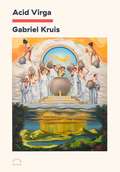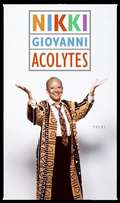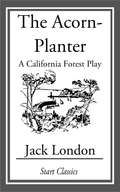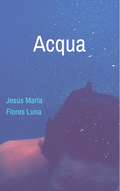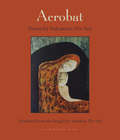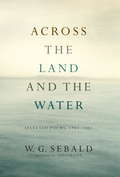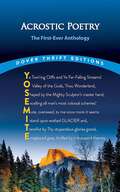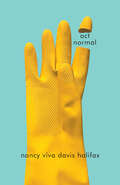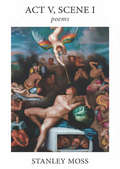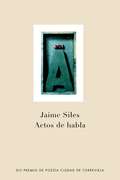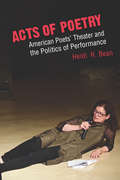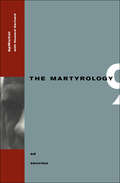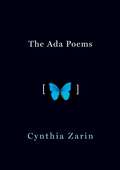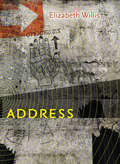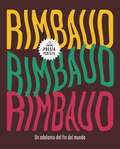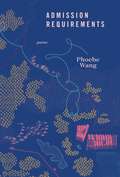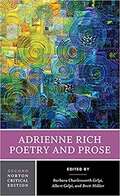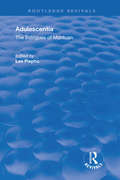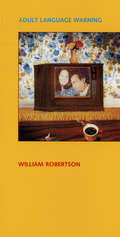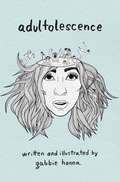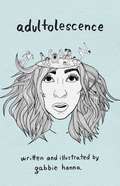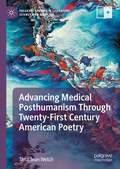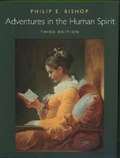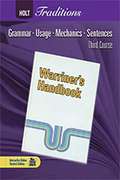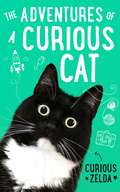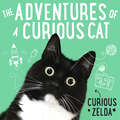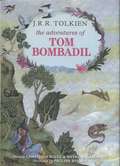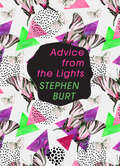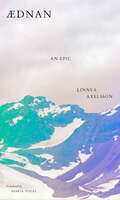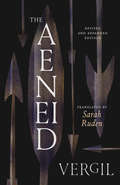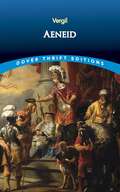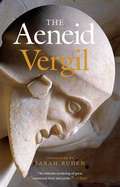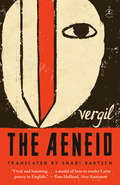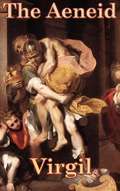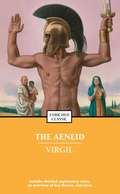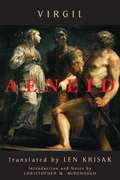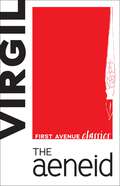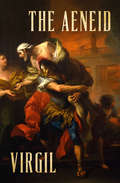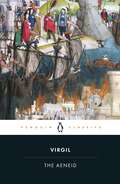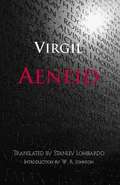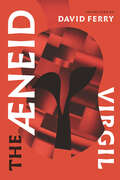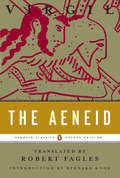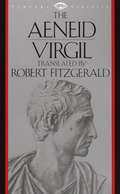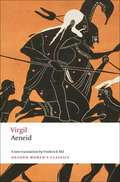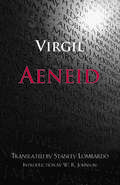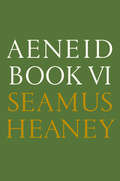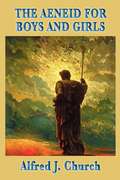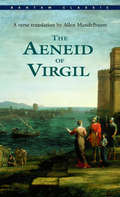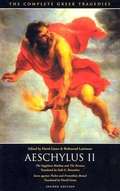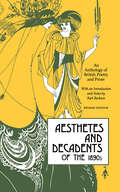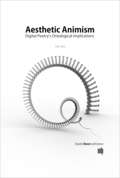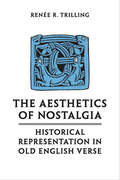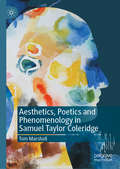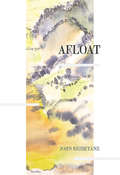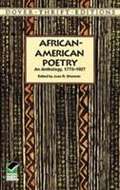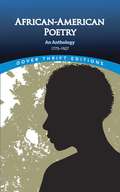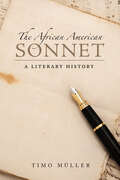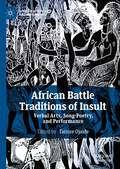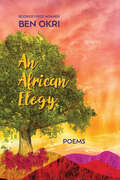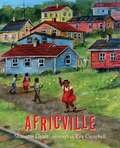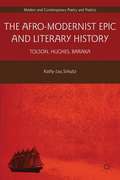- Table View
- List View
Abandoned Poems
by Stanley MossStanley Moss is ninety-three years old, still kicking sixty-two-yard field goals through the uprights of American poetry. His Abandoned Poems (Paul Valery wrote, "A poem is never finished, only abandoned") consists of 120 pages of new work written since his 2016 prize-winning book, Almost Complete Poems. The truth is Moss has a unique voice in the history of American poetry. He honors the English language. This book is full of invisible life-giving discoveries the reader has almost seen, and you might say Moss has discovered a new continent, a new planet or two--or simply it's fun. There is a final section, "Apocrypha and Long Abandoned Poems," which includes early misplaced work never published, and new versions of previously published poems. Bingo.
The Abandoned Settlements
by James SheardShortlisted for the 2017 T. S. Eliot PrizePBS Autumn RecommendationThe poems in James Sheard’s remarkable third book are about love and leaving, of how the rift of departure brings on a kind of haunting – of the people involved and the places where they lived – an emotional trace of departed lives and loves. This is what these poems are: the scars of separation, the spoors of desire. Sheard writes powerfully about loss, about how the vestiges of significance, of sensual heat, are retained by structures – in ghost towns, war-zones, deserted villages or resorts – but also by the human body and memory: ‘for love exists, and then is ruined, and then persists.’These are poems about permanence and fragility, of being uncertain whether the house you live in is a shell, or if you have become a shell by living there – whether emptiness means loss and abandonment or a clean start and a new beginning. But these are also poems full of the ache of desire, the tart, lingering smell of sex: poems shaped by longing.James Sheard is one of Britain’s most assured and precise lyric poets, and his third collection brings all his considerable strengths to poems as accurate and strange as thermal images.
The Abbotsford Mysteries
by Patricia SykesThe Abbotsford Convent becomes more than the setting of this poetry collection; it emerges as presence, intimate and familiar as well as constraining and forbidding. But, it is childhood itself that becomes the subterranean geography and pulse of this compilation as the poems explore what it means to grow up in an orphanage. Subject to the rules of lay and religious adults, the voices herein create multiple pathways through memory and time as they map and navigate the many-stranded mysteries of their institutionalized lives.
Abirami Andhadhi
by Abirami Pattar Kavingar KannadasanWhen Abirami Pattar's life was in danger,the Goddess Abirami manifested herself before pattar to save his life and threw her thadanga over the sky such that it shined with bright light upon the horizon.The hymns on the Goddess sung by the pattar is Abhirami Andhadhi.
About Crows
by Craig BlaisAn unsentimental and at times disquieting first collection, the poems ofAbout Crowsexcavate self, family, race, location, sex, art, and religion to uncover the artifacts of a succession of traumas that the speaker does not always experience firsthand but carries with him to refashion into some new importance. This is a book of half-states, broken affiliations, and dislocation. The speaker leads the reader through the fragments of a flooded town that grows increasingly elusive the more one looks for it; through a succession of Seoul "love motels" that further displace the outsider to unclaimed margins transformed into sites of creative invention; through "galleries" of artwork, where movement, color, and image are renewed through ekphrasis; and through the world of the metatextual long poem "The Cult Poem," where good and bad moral binaries tangle into a rat's nest of our best and worst spiritual ambitions. The poems and sequences ofAbout Crowsare marked by their artistic balance of the sublime and the profane, of polyphony, syntactical complexity, clashing images, cagey humor, and unsettling sincerity, all trying desperately to connect.
Above Ground
by Clint SmithA remarkable poetry collection with "inextinguishable generosity and abundant wisdom" (Monica Youn) from Clint Smith, the #1 New York Times bestselling and National Book Critics Circle award-winning author of How the Word Is Passed. Clint Smith&’s vibrant and compelling new collection traverses the vast emotional terrain of fatherhood, and explores how becoming a parent has recalibrated his sense of the world. There are poems that interrogate the ways our lives are shaped by both personal lineages and historical institutions. There are poems that revel in the wonder of discovering the world anew through the eyes of your children, as they discover it for the first time. There are poems that meditate on what it means to raise a family in a world filled with constant social and political tumult. Above Ground wrestles with how we hold wonder and despair in the same hands, how we carry intimate moments of joy and a collective sense of mourning in the same body. Smith&’s lyrical, narrative poems bring the reader on a journey not only through the early years of his children&’s lives, but through the changing world in which they are growing up—through the changing world of which we are all a part.Above Ground is a breathtaking collection that follows Smith's first award-winning book of poetry, Counting Descent.
Above the Birch Line: Poems
by Pia Pia Taavila-BorsheimAbove the Birch Line reflects a lifetime of observation and experience, and offers glimpses of the loves, aches, and comforts that have accompanied author Pia Taavila-Borsheim along the way. Written primarily in free verse, the poems are imagistic in nature, with an ongoing metaphor of visual representations of nature, especially water. Starting with her childhood and continuing through late adulthood, Taavila-Borsheim ruminates on her parents, travels, marriage, motherhood, and finally, aging and death.
Abraham
by Colin BrowneIn these passionate poems, this long poem, there is a story (there are stories) which a reader mines out of a landscape of language moulded under great pressure and eloquent of the stresses that formed it. This is non-representational work of great concentration and beauty.
Abraham Lincoln, a Man for All the People: A Ballad
by Myra Cohn Livingston"A man for all the people, A man who stood up tall, Abe Lincoln spoke of justice And liberty for all." This book includes brief quotes from several speeches, and a nice reference section. Need a book for a book report? This could be it! Other books by this author are available in this library.
The Absence of Zero
by R. KoleweThe Absence of Zero is a triumphantly-executed celebration of the long poem tradition. Consisting of 256 16-line quartets, and 34 free-form interruptions, this slow-moving haunting work is a beautiful example of thinking in language, a meditation that explores time and memory in both content and form. The 20th century is already more than 20 years past: The Absence of Zero is Kolewe's elegy to that era, and the disparate fragments of its ideas that continue to affect and disrupt our present.Praise for The Absence of Zero:"The interiors of R. Kolewe's epic poem The Absence of Zero, are anything but ... observance upon observance then another, continuous action … past and continuing, teeter, falter, tick by, lob between thoughts, threads, memories, what is, what was, what might befall, or. "Read again. Nothing beautiful." and absolutely absorbing, returning again and again to this place, this street, this window, this room. Know that once you enter, there is no going back. The presence of absence, all too familiar, begins to read, occupy you. It's a glorious achievement. Prepare to be mesmerized." —KIRBY, author of Poetry is Queer"Ralph Kolewe's The Absence of Zero is a daring, daily progression that depends upon return as palimpsest. Call it what it is. Gorgeous. Steadfastly urgent. Patient as dawn." —Margaret Christakos, author of charger and Dear Birch
The Absent God in the Works of William Wordsworth (Routledge Studies in Romanticism)
by Eliza BorkowskaCalled by one of its reviewers "Wordsworth’s biographia literaria," this book takes its reader on a fascinating journey into the mind of the poet whose attitude to God and religion points to a major shift in Western culture. The monograph probes the philosophical foundations of Wordsworth’s religious outlook, drawing attention to this First Generation Romantic poet as the author who happened to record in his verse the rise to prominence of some of the intellectual and spiritual challenges and the most troublesome uncertainties that have defined Western man ever since. The book constitutes a self-contained whole and can be read independently. Simultaneously, it creates an unusual duet with the companion volume, The Presence of God in the Works of William Wordsworth. These two works can be regarded as contraries—or negatives: one offering an ironically positive reading of Wordsworth’s religious discourse, the other offering a reading which is positively negative.
Absentia
by William StobbNew from the author of Nervous Systems, winner of the National Poetry Series. William Stobb has won acclaim for wide-ranging poetry that features tender realism, jazzy dissonance, luminous descriptions, and, in the words of Donald Revell, a "strange and elegantly accomplished serenity of tensions attenuated to their uttermost. " The poems in his second collection, Absentia, see the big picture-the sweep of history, the ongoing evolution of consciousness, evidence of geological time in the landscape. Humbled by scales beyond comprehension, Stobb is nonetheless seduced and stricken by the present in its many manifestations. Whether dealing with family, friends, or nature, the poems in Absentia, with their rich emotional palette and vivid, precise language, respond and transform, calling us to attend to the wide skies above and inside us. .
Absolute Solitude: Selected Poems
by Dulce Maria Loynaz James O'ConnorIn the first comprehensive selection and translation of Dulce María Loynaz's poetry, James O'Connor invites us to hear the haunting voice of Cuba's celebrated poet, whom the Nobel Laureate Juan Ramón Jiménez terms in his Foreword, "archaic and new...tender, weightless, rich in abandon." Widely published in Spain during the 1950s, Loynaz's poetry was almost forgotten in Cuba after the Revolution. International recognition came to her late: at the age of ninety she was living in seclusion in Havana when the Royal Spanish Academy awarded her the 1992 Cervantes Prize, the highest literary accolade in the Spanish language. The first English publication of her work, Absolute Solitude contains a selection of poems from each of Loynaz's books, including the acclaimed prose poems from Poems with No Names, a selection of posthumously published work.From the Trade Paperback edition.
Absolute Trust in the Goodness of the Earth
by Alice WalkerThe Pulitzer Prize-winning author ofThe Color Purplegives us her first new collection of poetry in more than a decade, poems that reaffirm her as "one of the best American writers of today" (The Washington Post). The forces of nature and the strength of the human spirit inspire the poems inAbsolute Trust in the Goodness of the Earth. Alice Walker opens us up to feeling and understanding with poems that cover a broad spectrum of emotions. With profound artistry, Walker searches for, discovers, and declares the fundamental beauty of existence, as she explores what it means to live life fully, to learn from it, and to grow both as an individual and as part of a greater spiritual community. In "The Same as Gold," Walker writes of the essence of grief, and of our inherent powers of love and acceptance. In "Everyone Who Works for Me," Walker considers, with humor and grace, the frenzy that permeates modern life--a frenzy that prevents us from seeing the beauty in everything we do until we step back and take the time to look at and comprehend ourselves and those around us. In "The Love of Bodies," Walker elegantly expresses the gratitude and tenderness we are capable of feeling for loved ones, living and dead, and the inescapable emotional connections that bind us together. About Walker's poetry, America has said, "In the tradition of Whitman, Walker sings, celebrates and agonizes over the ordinary vicissitudes that link and separate all of humankind," and the same could be said about this astonishing new collection. Despite the hunger we cannot possess more than this: Peace in a garden of our own. --fromAbsolute Trust in the Goodness of the Earth
The Absurd Man: Poems
by Major JacksonIn this knock-out collection, Major Jackson savors the complexity between perception and reality, the body and desire, accountability and judgment. Inspired by Albert Camus’s seminal Myth of Sisyphus, Major Jackson’s fifth volume subtly configures the poet as “absurd hero” and plunges headfirst into a search for stable ground in an unstable world. We follow Jackson’s restless, vulnerable speaker as he ponders creation in the face of meaninglessness, chronicles an increasingly technological world and the difficulty of social and political unity, probes a failed marriage, and grieves his lost mother with a stunning, lucid lyricism. The arc of a man emerges; he bravely confronts his past, including his betrayals and his mistakes, and questions who he is as a father, as a husband, as a son, and as a poet. With intense musicality and verve, The Absurd Man also faces outward, finding refuge in intellectual and sensuous passions. At once melancholic and jubilant, Jackson considers the journey of humanity, with all its foibles, as a sacred pattern of discovery reconciled by art and the imagination.
Abu Nuwas: A Genius of Poetry (Makers of the Muslim World)
by Philip F. KennedyThis is the first book to present the life, times and poetry of one of the greatest poets in the Arab tradition, Abu Nuwas. Author Philip Kennedy provides the narrative of Abu Nuwas's fascinating life, which was full of intrigue and debauched adventure, in parallel with the presentation of his greatest poems, across all genres, in easy and accessible translations, giving commentary where needed.
Abuela, Don't Forget Me
by Rex OgleA Finalist for the 2023 YALSA Excellence in Young Adult Nonfiction Award. Rex Ogle’s companion to Free Lunch and Punching Bag weaves humor, heartbreak, and hope into life-affirming poems that honor his grandmother’s legacy. In his award-winning memoir Free Lunch, Rex Ogle’s abuela features as a source of love and support. In this companion-in-verse, Rex captures and celebrates the powerful presence a woman he could always count on—to give him warm hugs and ear kisses, to teach him precious words in Spanish, to bring him to the library where he could take out as many books as he wanted, and to offer safety when darkness closed in. Throughout a coming of age marked by violence and dysfunction, Abuela’s red-brick house in Abilene, Texas, offered Rex the possibility of home, and Abuela herself the possibility for a better life. Abuela, Don’t Forget Me is a lyrical portrait of the transformative and towering woman who believed in Rex even when he didn’t yet know how to believe in himself.
The Academic Avant-Garde: Poetry and the American University
by Kimberly Quiogue AndrewsThe surprising story of the relationship between experimental poetry and literary studies.In The Academic Avant-Garde, Kimberly Quiogue Andrews makes a provocative case for the radical poetic possibilities of the work of literary scholarship and lays out a foundational theory of literary production in the context of the university. In her examination of the cross-pollination between the analytic humanities and the craft of poetry writing, Andrews tells a bold story about some of today's most innovative literary works. This pathbreaking intervention into contemporary American literature and higher education demonstrates that experimental poetry not only reflects nuanced concern about creative writing as a discipline but also uses the critical techniques of scholarship as a cornerstone of poetic practice. Structured around the concepts of academic labor (such as teaching) and methodological work (such as theorizing), the book traces these practices in the works of authors ranging from Claudia Rankine to John Ashbery, providing fresh readings of some of our era's most celebrated and difficult poets.
The Acceptance World: Book Three of A Dance to the Music of Time
by Anthony PowellAnthony Powell's universally acclaimed epic A Dance to the Music of Time offers a matchless panorama of twentieth-century London . Now, for the first time in decades, readers in the United States can read the books of Dance as they were originally published--as twelve individual novels--but with a twenty-first-century twist: they're available only as e-books.
Accidents of Composition
by Merlinda BobisIs it the sun a hole sucking in a bird or Icarus about to singe the sun? Which composes which? The poet asks as she circumnavigates the globe, history, and an inner universe. When it responds, there's the small shudder, the sprawl of a spin, or the quiet before and after a full circle. The eyes catch a black bird close to an eerie sun. Instantly, a poem: an accident of composition. Or a tree, rock, light from a story heard, dreamt, read or remembered returns as if it were the only tree, rock, light in the planet. The poet is caught, returned to her first heart: poetry. After four novels, Merlinda offers poems from the stillness of contemplation to the spinning of tales, then to passage across different histories. Glass becomes eternal greens underwater, fish gossip about colonisation, a gumnut turns dissident, and the dreams of Captain Cook and Pigafetta circumnavigate the globe leaving a trail of blood, beads, and the scent of cloves. But in between, the poet hopes: ‘there could be accidents / of kindness here.'
Accordian Breathing And Dancing
by Ruth L. SchwartzA collection of poems about AIDS from Ruth L. Schwartz who won the 1994 Associated Writing Programs Series award in Poetry.
According to the Small Hours
by Aidan MathewsIn this, his first collection of poems in fifteen years, Aidan Mathews brings together the sacred and the profane, playful and profound, the iconic and the everyday - illuminating the variousness and commonality of human experience. These poems wear their erudition lightly: dazzling us with their fresh observations, the strangely intimate details ('mice among the breadcrumbs of the Last Supper') and a fluid, metaphysical wit that can link a saint's matyrdom to a Sunday roast. Mercurial, passionate and always surprising, According to the Small Hours is a triumphant return to the form.
The Accounts
by Katie PetersonThe death of a mother alters forever a family's story of itself. Indeed, it taxes the ability of a family to tell that story at all. The Accounts narrates the struggle to speak with any clear understanding in the wake of that loss. The title poem attempts three explanations of the departure of a life from the earth--a physical account, a psychological account, and a spiritual account. It is embedded in a long narrative sequence that tries to state plainly the facts of the last days of the mother's life, in a room that formerly housed a television, next to a California backyard. The visual focus of that sequence, a robin's nest, poised above the family home, sings in a kind of lament, giving its own version of ways we can see the transformation of the dying into the dead. In other poems, called "Arguments," two voices exchange uncertain truths about subjects as high as heaven and as low as crime. Grief is a problem that cannot be solved by thinking, but that doesn't stop the mind, which relentlessly carries on, trying in vain to settle its accounts. The death of a well-loved person creates a debt that can never be repaid. It reminds the living of our own psychological debts to each other, and to the dead. In this sense, the death of this particular mother and the transformation of this particular family are evocative of a greater struggle against any changing reality, and the loss of all beautiful and passing forms of order.
Accretion
by Irfan AliAn extraordinary debut set in Toronto, unfurling against the backdrop of an ancient Persian love story. The story of Layla and Majnun, made immortal by the Persian poet Nizami Ganjavi in the 12th century, has been retold thousands of times, in thousands of different ways, throughout literature. Against the backdrop of this story, to the sound-track of modern hip-hop, and amid the struggle of an immigrant family to instill an old faith under new conditions, Irfan Ali’s Accretion hurtles towards an unsustainable, “greater madness.” Majnun, one of the foundational literary characters who haunt Accretion, is also an Arabic epithet for “possessed.” In this tradition, Ali has written a book from the places where the self is no longer the self; places where, in order not to shut down forever, the debris must be cleared, and the soul must inch towards love and hope, “on memory’s dusty beams.” Accretion is written in a contemporary lyricism that honours ancient poetic traditions. It is a familiar story, imbued with a particularity and honesty that only Irfan Ali could bring to the table.
El acercamiento de la mujer cactus y el hombre globo
by Rayden¿DE QUÉ LADO ESTÁ TU CORAZÓN? La primera novela de David Martínez Álvarez, RAYDEN, es un canto al valor de lo diferente. Una historia de amor a golpe de extremos. Un volcán despierto. DESCUBRE AL ESCRITOR TRAS LAS CANCIONES «No sé qué fue antes, si la canción o la novela, pero gracias a la mujer cactus y al hombre globo por acercar posturas. En un mundo donde tachan de imposible lo diferente, mi corazón está del lado de los improbables que se atreven».David Martínez Álvarez, Rayden Sáhara ama las flores aunque tiene nombre de desierto. Sáhara trabaja en el negocio familiar. Una pequeña floristería en Malasaña. Ciro es un joven lleno de aspiraciones frustradas. Vive en una habitación en Lavapiés. Ciro choca con Nicolás, un repartidor de comida. Decide suplantar su identidad y trabajar con su nombre. Nico-Ciro y Sáhara chocan en el Ojalá. Abren varias puertas que son volcanes. Y deciden arder. David Martínez Álvarez se desviste de Rayden y construye una novela que es poesía, teatro, tragicomedia, alegoría y caos en su debut como escritor. El acercamiento de la mujer cactus y el hombre globo es una historia de amor urbano contada a cañonazos donde la verdad aflora como un mosquito en el zumo.
Achilleid
by Statius Stanley Lombardo Peter Heslin"One of the most entertaining short narratives of all time, the Achilleid is a stand-alone work of compelling contemporary interest that moves with great rapidity and clarity. Its compact narrative, which encompasses a brutish childhood, an overprotective mother, temporary gender bending, sexual violence, and a final coming to manhood with the promise of future military prowess, may be unparalleled in a single narrative of such brevity. The text has survived in hundreds of manuscripts, sometimes copied with Statius’ much longer and lugubrious Thebaid, but just as often with other racy short narratives and dramas taught in the medieval schools. The poem’s literary playfulness, visual imagery, and lighthearted treatment of mythological and historical data made it—and can still make it—a goldmine in the classroom. Until now, however, it has been virtually impossible to get a sense of the work if one did not know Latin—recent translations notwithstanding. Stanley Lombardo's translation of the Achilleid is a dream: it’s sound, enthralling, and will fully engage readers with this enticing, perplexing, at times distressing, but ultimately rewarding work." —Marjorie Curry Woods, Blumberg Centennial Professor of English and University Distinguished Teaching Professor, The University of Texas at Austin
Achilles And Hector: The Homeric Hero
by Seth Benardete Michael Davis Ronna BurgerSeth Benardete's study of the Iliad, which initiated his scholarly career, bears the hallmarks of the unique turn of mind that characterized all his later work. In a brief Note written thirty years later, included in this volume, he looks back on what he sees as the limits of his original reading of the Iliad. Yet he seems to have been aware of the fundamental problems from early on that he wrestled with explicitly when he returned to Homer some forty years later: the question of the relations among gods, fate, and human choice, which lies at the core of his late "Platonic reading" of the Odyssey, is already guiding his understanding of the Iliad. And he saw, in working out that understanding, how those relations take on a very distinct form for the tragic hero in contrast with the comic hero - Achilles in contrast with Odysseus.
Acid Virga
by Gabriel Kruis&“Gabriel Kruis is a really formidable poet. Acid Virga is rather terrifying, also a tour de force and a formal breakthrough. . . a blend of narrative and lyric the way the mind is. . . &” —ALICE NOTLEY &“As wildly visionary as it is linguistically alive, Gabriel Kruis&’s Acid Virga drills down into the bedrock of American life to produce a book unparalleled in its exploration of how visionary experience and social upheaval collide in ways that are both transformative and annihilating.&” —TOM SLEIGH &“If you&’ve ever been conscious, and felt a little disturbed about it, of life as ancient and ephemeral or that falling apart is an integral force, this is a book to read over and over.&” —STACY SZYMASZEK &“. . .a great affliction and affection inform Acid Virga, fast-moving with strophes like brisk moving cloud banks over the mind in your heart.&” —MAJOR JACKSON &“Meanwhile, in el mal pais, leaned out on mucinex, mixing dexy cocktails in the haloed pharmacy of the car...&” An unusually assured debut, Acid Virga is a memoir in verse cutting between a vivid Southwest upbringing and modern O&’Hara hustle in New York City, deeply and seriously reckoning with the psychedelic heritage of religion and the psychological clarity of chemical consciousness. It is both thrillingly propulsive and dense enough to read again and again, always offering up something new. Language is boundlessly specific, evocative of states internal and external, reading at times like a melancholy memoir stuck between stations, an epic poem or even a philosophical tract, always a true and important record of our American lives as lived now—an endless and reliable ticker tape of the soul.
Acolytes: Poems
by Nikki GiovanniA collection of eighty all new poems, Acolytes is distinctly Nikki Giovanni, but different. Not softened, but more inspired by love, celebration, memories and even nostalgia. She aims her intimate and sparing words at family and friends, the deaths of heroes and friends, favorite meals and candy, nature, libraries, and theatre. But in between, the deep and edgy conscience that has defined her for decades shines through when she writes about Rosa Parks, hurricane Katrina, and Emmett Till's disappearance, leaving no doubt that Nikki has not traded one approach for another, but simply made room for both.
The Acorn-Planter: A California Forest Play
by Jack LondonJack London was an American novelist, journalist, social-activist and short-story writer whose works deal romantically with elemental struggles for survival. At his peak, he was the highest paid and the most popular of all living writers. Because of early financial difficulties, he was largely self educated past grammar school. London drew heavily on his life experiences in his writing. He spent time in the Klondike during the Gold Rush and at various times was an oyster pirate, a seaman, a sealer, and a hobo. His first work was published in 1898. From there he went on to write such American classics as Call of the Wild, Sea Wolf, and White Fang.
Acqua
by Jesús María Flores LunaAcqua di Jesús María Flores Luna Agua presenta 10 poesie dalla trasparenza dell'acqua alla sua corsa sotto le città. È una raccolta di poesie sull'acqua. Dal suo aspetto e dal primo contatto dell'uomo con esso, seguendo il suo uso quotidiano di sopravvivenza per il mondo, per il flusso e la corsa sotto le città e il loro inquinamento oggi.
Acrobat
by Nabaneeta Dev SenA deeply humane new collection by a luminary of Bengali literatureA radiant collection of poetry about womanhood, intimacy, and the body politic that together evokes the arc of an ordinary life. Nabaneeta Dev Sen's rhythmic lines explore the joys and agonies of first love, childbirth, and decay with a restless, tactile imagination, both picking apart and celebrating the rituals that make us human. When she warns, "know that blood can be easily drawn by lips," her words tune to the fierce and biting depths of language, to the "treachery that lingers on tongue tips." At once compassionate and unsparing, conversational and symphonic, these poems tell of a rope shivering beneath an acrobat's nimble feet or of a twisted, blood-soaked umbilical cord -- they pluck the invisible threads that bind us together.
Across the Land and the Water
by W. G. SebaldA publishing landmark--the first major collection of poems by one of the late twentieth century's literary masters German-born W. G. Sebald is best known as the innovative author of Austerlitz, the prose classic of World War II culpability and conscience that The Guardian called "a new literary form, part hybrid novel, part memoir, part travelogue." Its publication put Sebald in the company of Nabokov, Calvino, and Borges. Yet Sebald's brilliance as a poet has been largely unacknowledged--until now. Skillfully translated by Iain Galbraith, the nearly one hundred poems in Across the Land and the Water range from those Sebald wrote as a student in the sixties to those completed right before his untimely death in 2001. Featuring eighty-eight poems published in English for the first time and thirty-three from unpublished manuscripts, this collection also brings together all the verse he placed in books and journals during his lifetime. Here are Sebald's trademark themes--from nature and history ("Events of war within/a life cracks/across the Order of the World/spreading from Cassiopeia/a diffuse pain reaching into/the upturned leaves on the trees"), to wandering and wondering ("I have even begun/to speak in foreign tongues/roaming like a nomad in my own/town . . ."), to oblivion and memory ("If you knew every cranny/of my heart/you would yet be ignorant/of the pain my happy/memories bring"). Soaring and searing, the poetry of W. G. Sebald is an indelible addition to his superb body of work, and this unique collection is bound to become a classic in its own right.From the Hardcover edition.
Acrostic Poetry: The First-Ever Anthology (Dover Thrift Editions: Poetry)
by Heidi GagnonIn this first-ever anthology, more than 80 acrostics show the versatility of a storied poetic form that dates back to ancient times. In standard acrostics, the initial letters of successive lines spell out words when read vertically. Highlights include Lewis Carroll’s acrostic about the namesake of his Alice character, Edward Lear’s humorous alphabet poem, Edgar Allan Poe’s sonnet with a name arranged diagonally, and a forty-stanza poem spelling out the Lord’s Prayer. Informative chapter introductions explore acrostic legends, including Sir John Davies, who began the tradition of using the form to praise someone’s name with acrostics about Queen Elizabeth I, and George Moses Horton, an African American slave who peddled produce and poems before he learned to write. "Beginning with ancient acrostic poetry, the information in this remarkable book shares the fascinating history of this poetic form. Michael Croland’s well chronicled details reveal how acrostics have woven through society’s history. This rewarding collection of poems is a welcome gift for spreading interest and delight in acrostics." —Avis Harley, author of African Acrostics: A Word in Edgeways “There’s a first time for everything,” 'they say, and that is apparently true for Michael Croland’s gathering of poems written in the venerable verse form called “acrostics.” . . . Croland has treated the subject exhaustively in this interesting volume.'" —Lewis Turco, author of The Book of Forms "Far from basic poetry, acrostics, the introduction notes, 'have an ancient history in Latin, Greek, and Hebrew' and transcend the constrained form. From Blackwell’s three-line acrostic about the sun to Chilton’s lengthy poem about The Lord’s Prayer, readers will savor poems on assorted subjects from both famous authors and unknown writers." —Lisa M. Bolt Simons, author of Acrostic Poems "Aficionados of wordplay will delight in this long overdue compendium of an often undervalued art form, which also discusses its history and highlights, along with variations ancient and modern such as the hidden acrostics in Shakespeare, Joyce, and, not unexpectedly, Lewis Carroll." —Mark Burstein, president emeritus of The Lewis Carroll Society of North America "It’s a poetic party on paper for Word Nerds like me, and a must-read for devotees of the form." —Brian P. Cleary, author of Bow-Tie Pasta: Acrostic Poems
act normal (Hugh MacLennan Poetry Series #80)
by nancy viva davis halifaxi might never be no-one that shiny / the beauty of a sequin’d self / what was stitched into heaven’s dropThe poems in act normal use illegibility and wilful uncertainty to evade the grasp of the normative, as endured by those institutionalized by, and through, the concept of normalcy.act normal starts in an institution where children categorized and constructed as intellectually inferior are placed into custodial care. These poems are inquisitive, articulating the entanglements of lives across categories of difference – particularly the lives of those who as children were considered to be other or less than human. Drawing upon conversations, archival materials, court cases, legislation, transcripts, and case histories, among other sources, nancy davis halifax’s poems destabilize categories of meaning – understanding disability and difference as “undecidability.”act normal is a movement of “feelingthought,” unsettling normative expectations and inviting readers to re-orient from the normative task of assuming the safety of consensual interpretation, while risking, cherishing, and performing non-indifference.
Act V Scene I: Poems
by Stanley Moss&“Open Act V, Scene I or any of Stanley Moss&’s books anywhere, and you will come shockingly upon wisdom and beauty, a diversity of styles—a unity of voice, a voice that was there since the beginning. I love Stanley Moss&’s work. The pace, the strategy, the wit, the knowledge are astonishing. Of the generation that is gradually leaving us, those born in the mid- and late-1920s, he has a prominent place. He loves donkeys. He owns Ted Roethke&’s raccoon coat. He is an original.&”—Gerald Stern &“Magisterial. . . this book is magnificent. I&’ve read it several times with greater and greater pleasure. Its verbal generosity and bravura, its humanity, the quality and quantity of information which it generates into poetry of the highest order make it a continuing delight.&”—Marilyn Hacker &“. . . In our epoch of turmoil, crisis, and grief, I find that Moss&’s poetry still, always, brings me a little closer to happiness.&” —Forrest Gander &“I&’ve loved Stanley&’s poems since I first encountered a poem of his in Poetry magazine in John Berryman&’s office when I was nineteen.&” —W.S. Merwin &“. . . This is a book to hold onto for dear life.&” —Rosanna Warren I Choose to Write a Poem I choose to write a poemwhen my left ankle&’s broken, purple, and my right ankle&’s swollen blue,both knees banged, twice their usual size, both my long legs &“killing me,&”while a famous angel is really killing me.I separate physical pain from the real thing— the real thing, the soul usually diesbefore the body. My soul is dancing, welcoming spring in the gardenon a beautiful June morning, ready to live forever.
Actos de habla
by Jaime SilesUna reflexión sobre la melancolía del ego, entendido como «yo lírico». Un acto del lenguaje y, como tal, una expresión del tiempo y la experiencia intelectual a través de la palabra. XIII Premio de poesía Ciudad de Torrevieja Actos de habla se compone de 11 poemas que giran en torno a la identidad, el tiempo y la palabra. Algunos de los poemas se gestaron en la ciudad de Florencia, donde el autor pasó una temporada, y que es uno de los escenarios del libro. Allí entró en contacto con una máquina de cine de posguerra, que fue lo que le inspiró varios versos y la influencia del cine que puede apreciarse en la lectura. Esto entronca con el análisis que hace de la percepción del lenguaje, con poemas exclusivos que interpretan a una voz poemática que intenta dignificar el lenguaje coloquial. Lo más destacado de los poemas es su excelente sonoridad, su ritmo perfecto, las imágenes poderosas y el homenaje a Keats. La belleza, el dolor y la reflexión sobre la identidad y la nada se mezclan en un original punto de vista lleno de ironía. En estos actos de lenguaje, Jaime Siles expresa el mundo a través de la palabra, y lo hace dando una visión melancólica de la existencia.
Actos de habla
by Jaime SilesActos de habla se compone de 11 poemas que giran en torno a la identidad, el tiempo y la palabra.Algunos de los poemas se gestaron en la ciudad de Florencia, donde el autor pasó una temporada, y que es uno de los escenarios del libro. Allí entró en contacto con una máquina de cine de posguerra, que fue lo que le inspiró varios versos y la influencia del cine que puede apreciarse en la lectura.Esto entronca con el análisis que hace de la percepción del lenguaje, con poemas exclusivos que interpretan a una voz poemática que intenta dignificar el lenguaje coloquial.Lo más destacado de los poemas es su excelente sonoridad, su ritmo perfecto, las imágenes poderosas y el homenaje a Keats. La belleza, el dolor y la reflexión sobre la identidad y la nada se mezclan en un original punto de vista lleno de ironía.En estos actos de lenguaje, Jaime Siles expresa el mundo a través de la palabra, y lo hace dando una visión melancólica de la existencia.
Acts of Poetry: American Poets' Theater and the Politics of Performance
by Heidi R BeanAmerican poets’ theater emerged in the postwar period alongside the rich, performance-oriented poetry and theater scenes that proliferated on the makeshift stages of urban coffee houses, shared apartments, and underground theaters, yet its significance has been largely overlooked by critics. Acts of Poetry shines a spotlight on poets’ theater’s key groups, practitioners, influencers, and inheritors, such as the Poets’ Theatre, the Living Theatre, Gertrude Stein, Bunny Lang, Frank O’Hara, Amiri Baraka, Carla Harryman, and Suzan-Lori Parks. Heidi R. Bean demonstrates the importance of poets’ theater in the development of twentieth-century theater and performance poetry, and especially evolving notions of the audience’s role in performance, and in narratives of the relationship between performance and everyday life. Drawing on an extensive archive of scripts, production materials, personal correspondence, theater records, interviews, manifestoes, editorials, and reviews, the book captures critical assessments and behind-the-scenes discussions that enrich our understanding of the intertwined histories of American theater and American poetry in the twentieth century.
Ad Sanctos: The Martyrology Book 9
by Bp Nichol'All of Nichol's work is stamped by his desire to create texts that are engaging in themselves as well as in context, and to use indirect structural and textual devices to carry meaning. In The Martyrology different ways of speaking testify to a journey through different ways of being. Language is both the poet's instructor and, through its various permutations, the dominant "image" of the poem. The [nine] books of The Martyrology document a poet's quest for insight into himself and his writing through scrupulous attention to the messages hidden in the morphology of his own speech.' - Frank Davey
The Ada Poems
by Cynthia ZarinA dazzling story of obsessive love emerges in Cynthia Zarin's luminous new book inspired and inhabited by the title character of Nabokov's novel Ada, or Ardor: A Family Chronicle, who was the lifelong love of her half brother, Van.These electric poems are set in a Nabokovian landscape of memory in which real places, people, and things--the exploration of the Hudson River, Edwardian London, sunflowers, Chekhov, Harlem, decks of cards, the death of Solzhenitsyn, morpho butterflies--collide with the speaker's own protean tale of desire and loss. With a string of brilliant contemporary sonnets as its spine, the book is a headlong display of mastery and sorrow: in the opening poem, "Birch," the poet writes "Abide with me, arrive / at its skinned branches, its arms pulled / from the sapling . . . the birch all elbows, taking us in." But Zarin does not "Destroy and forget" as Nabokov's witty, tender Ada would have her do; rather, as she writes in "Fugue: Pilgrim Valley," "The past's / clear colors make the future dim, Lethe's / swale lined with willow twigs." Like all enduring love poetry, these poems are a gorgeous refusal to forget.A riveting, high-stakes performance by one of our major poets, The Ada Poemsextends the reach of American poetry.From the Hardcover edition.
Address (Wesleyan Poetry Series)
by Elizabeth WillisAddress draws us into visible and invisible architectures, into acts of intimate and public address. These poems are concentrated, polyvocal, and sharply attentive to acts of representation; they take personally their politics and in the process reveal something about the way civic structures inhabit the imagination. Poisonous plants, witches, anthems, bees--beneath their surface, we glimpse the fragility of our founding, republican aspirations and witness a disintegrating landscape artfully transformed. If a poem can serve as a kind of astrolabe, measuring distances both cosmic and immediate, temporal and physical, it does so by imaginative, nonlinear means. Here, past and present engage in acts of mutual interrogation and critique, and within this dynamic Willis's poetry is at once complexly authoritative and searching: "so begins our legislation."
Un adelanto del fin del mundo (Flash Poesía #Volumen)
by Arthur RimbaudUn adelanto del fin del mundo, de la colección «Poesía portátil», es una colección de embates apasionados de Arthur Rimbaud, un rebelde que supo hurgar en el infierno para revolucionar la poesía. Rimbaud rompió las costuras de la poesía moderna cuando todavía no había cumplido veinte años. A tan pronta edad deflagró también los límites de la bohemia. Rebelde ejemplar, entendía la figura del poeta como una suerte de vidente de una vida nueva, un icono romántico movido por una fiebre que estrellaba en decenas de hojas sueltas. Reunimos ahora algunos de sus principales poemas, resultado de sus años en París, de la truculenta pasión que le unió a Paul Verlaine, del malvivir, el emborracharse, del no ser feliz pero ser siempre salvaje.
Adhoora Aasman Gazal Sangrah: अधूरा आस्माँ (ग़ज़ल संग्रह)
by Vinod Asudani Rajesh Asudani 'Raqeeb'‘अधूरा आस्माँ’, इस पुस्तक की रचना उन दो संवेदनशील रचनाकारों ने की है जिनकी आँखों ने कभी रोशनी को महसूस तक नहीं किया है । गहन अंधेरे के अन्तहीन समन्दर की अनंत गहराइयों में जिनकी संवेदनाओं ने जिंदगी के हर उजले-काले पक्ष को देखा है, महसूस किया है और भोगा भी है, उन आसूदानी बंधुओं (श्री विनोद आसूदानी और श्री राजेश आसूदानी 'रकीब') ने जिंदगी के साथ गुफ्तगू करती हुई इस पुस्तक की रचना कर मानवीय क्षमता की एक और बुलंदी पर अपना नाम दर्ज कर दिया है। गज़ल संग्रह में विनोद और राजेश की पचास - पचास इस तरह कुल एक सौ गज़लें समाहित है। कवियों ने बहर और वज़न का पूरा-पूरा ध्यान रखने का प्रयास किया है और सभी गज़लें बहुत अच्छी हैं - पठनीय हैं । हाँ दो-तीन गजलें ज़रूर ऐसी है जिन्हें कुछ और तराशा जाता तो वे और अधिक निखर जातीं । गजलों की भाषा आम बोलचाल की भाषा वाली सरल सहज हिंदुस्तानी' है जिसे उर्दू के शब्दों ने और अधिक आकर्षक और प्रभावशाली बना दिया है ।
Adio
by Bitoriano Gandiaga ArtetxeBaserri familiako giroa lana zen. Bakardadea, mendia, isiltasuna, gaua, ipuinak. Oraindik ere umetako mendiak entzuten ditut Arantzazun. Gauez "tzi-tzi-tzi..." mendia beteta dago zurrumurruz, argiz, ipuinez, misterioz, beldurrez. Mendiko isiltasuna esaten da beti, eta egia da, baina mendiko isitasun berezi bat da, gauza harrigarriz bete-beterik.
Admission Requirements
by Phoebe WangA debut collection from a startling new voice in Canadian poetry.The poems in Admission Requirements attempt to discover what is required of us when we cut across our material and psychic geographies. Simultaneously full and empty of its origins, the self is continually taxed of any certainties and ways of being. The speaker in these poems is engaged in a kind of fieldwork, surveying gardens, communities, and the haphazard cityscape, where the reader is presented with the paradoxes of subsumed histories. With understated irony and unsettling imagery, the poems address the internal conflicts inherent in contemporary living.
Adrienne Rich: Poetry and Prose
by Adrienne Rich Albert Gelpi Barbara Charlesworth Gelpi Brett C. MillierThis Norton Critical Edition includes: <p><p> • Generous selections of poetry and prose from the entire oeuvre of one of America’s most influential poets. • An introduction and explanatory annotations by Barbara Charlesworth Gelpi, Albert Gelpi, and Brett Millier. • Fifteen reviews and critical commentaries, nine of them new to the Second Edition, carefully chosen as a guide to Adrienne Rich’s poetics―and to her poetics as related to politics―ranging from W. H. Auden’s 1951 response to her first book to critics’ reviews of the magisterial Collected Poems in 2016. • A Chronology, a Selected Bibliography, and an Index.
Adulescentia: The eclogues of Mantuan (Routledge Revivals)
by Lee PiephoFirst published in 1989, Piepho has translated the Latin works of Mantuan’s eclogues, which play such a crucial role in the culture of Western Europe during the sixteenth and seventeenth centuries.
Adult Language Warning
by William RobertsonAt the time of writing this book, William Robertson was a homemaker. His poems bring a new passion to the ancient domestic scene, and to everything else he looks at out of that often-turbulent centre. He ventures with care "into a swelling sea/ of silted meanings" equipped with his own elegant flexible vernacular, shaped precisely to the task of lighting up the trials and wonders of ostensibly ordinary days. These poems ring like crystal-hard edges of a tender heart.
Adultolescence
by Gabbie HannaGabbie Hanna disarms the sacred and elevates the mundane in this exhilarating debut collection of illustrated poems. Ranging from the sing-song rhythms of children’s verses and a sophisticated confessional style, Gabbie explores the emotionally charged space between childhood and womanhood, revealing her own longings, obsessions, and insecurities along the way. Adultolescence heralds the arrival of an artist with a magical ability to connect through alienation, bury truth bombs within observations about pizza cravings and social media, and detonate wickedly funny jokes between moments of existential dread. You’ll turn to the last page because you get her, and you’ll return to the first page because she gets you.
Adultolescence
by Gabbie HannaA collection of more than 150 witty and edgy poems about love and relationships from the YouTube comedian and vlogger behind ‘The Gabbie Show’. Gabbie Hanna disarms the sacred and elevates the mundane in this exhilarating debut collection of illustrated poems. Ranging from the sing-song rhythms of children’s verses and a sophisticated confessional style, Gabbie explores the emotionally charged space between childhood and womanhood, revealing her own longings, obsessions, and insecurities along the way. Adultolescence heralds the arrival of an artist with a magical ability to connect through alienation, bury truth bombs within observations about pizza cravings and social media, and detonate wickedly funny jokes between moments of existential dread. You’ll turn to the last page because you get her, and you’ll return to the first page because she gets you.
Adultolescence
by Gabbie Hanna<P>Comedian Gabbie Hanna brings levity to the twists and turns of modern adulthood in this exhilarating debut collection of illustrated poetry. <P>In poems ranging from the singsong rhythms of children’s verses to a sophisticated confessional style, Gabbie explores what it means to feel like a kid and an adult all at once, revealing her own longings, obsessions, and insecurities along the way. <P>Adultolescence announces the arrival of a brilliant new voice with a magical ability to connect through alienation, cut to the profound with internet slang, and detonate wickedly funny jokes between moments of existential dread. <P>You’ll turn to the last page because you get her, and you’ll return to the first because she gets you. <P><b>A New York Times Bestseller</b>
Advancing Medical Posthumanism Through Twenty-First Century American Poetry (Palgrave Studies in Literature, Science and Medicine)
by Tana Jean WelchAdvancing Medical Posthumanism Through Twenty-First Century American Poetry places contemporary poetics in dialogue with posthumanism and biomedicine in order to create a framework for advancing a posthuman-affirmative ethics within the culture of medical practice. This book makes a case for a posthumanist understanding of the body—one that sees health and illness not as properties possessed by individual bodies, but as processes that connect bodies to their social and natural environment, shaping their capacity to act, think, and feel. Tana Jean Welch demonstrates how contemporary American poetry is specifically poised to develop a pathway toward a posthuman intervention in biomedicine, the field of medical humanities, medical discourse, and the value systems that guide U.S. healthcare in general.
Adventures in English Literature (Heritage Edition)
by Leopold Damrosch Leonard F. Dean William Reach Getald LevinThis book is an effective compilation of literary works by various authors, ranging through the Anglo-Saxon period to Elizabethan to Victorian age, Shakespeare to John Milton to Bernard Shaw.
Adventures In The Human Spirit (Third Edition)
by Philip E. BishopExceptionally student-friendly, extensively illustrated, and engagingly thought-provoking, this one-volume historical survey of the humanities is accessible--and inviting--to readers with little background in the arts and humanities. Carefully balanced among the major arts, philosophy, and religion and finely focused on selected principal events, styles, movements, and figures, it brings the past to life by including authentic documents from daily life, comparative global perspectives, and examples from literature, philosophy, music--including the contributions of women and minority artists. For individuals waiting to discover the humanities' rich connections to their own
The Adventures of a Curious Cat: wit and wisdom from Curious Zelda, purrfect for cats and their humans
by Curious Zelda'A purrfect gift for a loved one with a special affinity for the feline' 'An absolute must for any cat lover''Curiosity is more than a desire to discover. It's a lifestyle, and a purrvilege. It's hours of observing a fly on the wall. It's entering the sock drawer just before it closes. It's sniffing the lampshade one more time . . .'Such is the wisdom of Curious Zelda: social media star, agony aunt, yoga teacher, cat. In The Adventures of a Curious Cat she gives insight into her view of the world and dispenses unparalleled wisdom. Zelda explains, in her unique voice, how to handle humans, how to communicate with furniture, and most importantly how to live a life curiously. It's the ultimate self-help guide for any cat, or indeed, their human.
The Adventures of a Curious Cat: wit and wisdom from Curious Zelda, purrfect for cats and their humans
by Curious Zelda'A purrfect gift for a loved one with a special affinity for the feline''An absolute must for any cat lover''Curiosity is more than a desire to discover. It's a lifestyle, and a purrvilege. It's hours of observing a fly on the wall. It's entering the sock drawer just before it closes. It's sniffing the lampshade one more time . . .'Such is the wisdom of Curious Zelda: social media star, agony aunt, yoga teacher, cat. In The Adventures of a Curious Catshe gives insight into her view of the world and dispenses unparalleled wisdom. Zelda explains, in her unique voice, how to handle humans, how to communicate with furniture, and most importantly how to live a life curiously. It's the ultimate self-help guide for any cat, or indeed, their human.
The Adventures of a Curious Cat: wit and wisdom from Curious Zelda, purrfect for cats and their humans
by Curious Zelda'Curiosity is more than a desire to discover. It's a lifestyle, and a purrvilege. It's hours of observing a fly on the wall. It's entering the sock drawer just before it closes. It's sniffing the lampshade one more time . . .'Such is the wisdom of Curious Zelda: social media star, agony aunt, yoga teacher, cat. In The Adventures of a Curious Cat she gives insight into her view of the world and dispenses unparalleled wisdom. Zelda explains, in her unique voice, how to handle humans, how to communicate with furniture, and most importantly how to live a life curiously. It's the ultimate self-help guide for any cat, or indeed, their human.
The Adventures Of Taxi Dog
by Debra Barracca Sal BarraccaA stray dog in New York City is adopted by a taxi driver, with whom he thereafter rides and shares adventures each day.
The Adventures of Tom Bombadil): and Other Verses from the Red Book
by J.R.R. Tolkien'Here is something that no devotee of the Hobbit epic can afford to miss, while awaiting a further instalment of the history of these fascinating people.' So declared the jacket of this book when it was first published some fifty years ago. One of the most intriguing characters in The Lord of the Rings, the amusing and enigmatic Tom Bombadil, also appears in verses said to have been written by Hobbits and preserved in the 'Red Book' with stories of Bilbo and Frodo Baggins and their friends. The Adventures of Tom Bombadil collects these and other poems, mainly concerned with legends and jests of the Shire at the end of the Third Age. 'Professor Tolkien revealed in the verses scattered through The Hobbit that he had a talent for songs, riddling rhymes, and a kind of balladry. In The Adventures of Tom Bombadil the talent can be seen to be close to genius.' Listener This special edition has been expanded for the first time to include earlier versions of some of Tolkien's poems, a fragment of a prose story with Tom Bombadil, and comprehensive notes by acclaimed Tolkien scholars Christina Scull and Wayne G. Hammond. You'll find a large treasury of books by and about J. R. R. Tolkien in the bookshare library.
Advice from the Lights: Poems
by Stephanie Burt“The brightest and most inviting of Burt’s collections for readers of any, all, and no genders.”—Boston ReviewAdvice from the Lights is a brilliant and candid exploration of gender and identity and a series of looks at a formative past. It’s part nostalgia, part confusion, and part an ongoing wondering: How do any of us achieve adulthood? And why would we want to, if we had the choice? This collection is woven from and interrupted by extraordinary sequences, including Stephanie poems about Stephen’s female self; poems on particular years of the poet’s early life, each with its own memories, desires, insecurities, and pop songs; and versions of poems by the Greek poet Callimachus, whose present-day incarnation worries (who doesn’t?) about mortality, the favor of the gods, and the career of Taylor Swift. The collection also includes poems on politics, location, and parenthood. Taken all together, this is Stephen Burt’s most personal and most accomplished collection, an essential work that asks who we are, how we become ourselves, and why we make art.
Aednan: An Epic
by Linnea AxelssonThe winner of Sweden&’s most prestigious literary award makes her American debut with an epic, multigenerational novel-in-verse about two Sámi families and their quest to stay together across a century of migration, violence, and colonial trauma.In Northern Sámi, the word Ædnan means the land, the earth, and my mother. These are all crucial forces within the lives of the Indigenous families that animate this groundbreaking book: an astonishing verse novel that chronicles a hundred years of change: a book that will one day stand alongside Halldór Laxness&’s Independent People and Sigrid Undset&’s Kristin Lavransdatter as an essential Scandinavian epic.The tale begins in the 1910s, as Ristin and her family migrate their herd of reindeer to summer grounds. Along the way, forced to separate due to the newly formed border between Sweden and Norway, Ristin loses one of her sons in the aftermath of an accident, a grief that will ripple across the rest of the book. In the wake of this tragedy, Ristin struggles to manage what&’s left of her family and her community.In the 1970s, Lise, as part of a new generation of Sámi grappling with questions of identity and inheritance, reflects on her traumatic childhood, when she was forced to leave her parents and was placed in a Nomad School to be stripped of the language of her ancestors. Finally, in the 2010s we meet Lise&’s daughter, Sandra, an embodiment of Indigenous resilience, an activist fighting for reparations in a highly publicized land rights trial, in a time when the Sámi language is all but lost.Weaving together the voices of half a dozen characters, from elders to young people unsure of their heritage, Axelsson has created a moving family saga around the consequences of colonial settlement. Ædnan is a powerful reminder of how durable language can be, even when it is borrowed, especially when it has to hold what no longer remains. &“I was the weight / in the stone you brought / back from the coast // to place on / my grave,&” one character says to another from beyond the grave. &“And I flew above / the boat calling / to you all: // There will be rain / there will be rain.&”
The Aeneid: Translated By Shadi Bartsch (The\focus Classical Library)
by VergilA powerful and poignant translation of Vergil&’s epic poem, newly equipped with introduction and notes This is a substantial revision of Sarah Ruden&’s celebrated 2008 translation of Vergil&’s Aeneid, which was acclaimed by Garry Wills as &“the first translation since Dryden&’s that can be read as a great English poem in itself.&” Ruden&’s line-for-line translation in iambic pentameter is an astonishing feat, unique among modern translations. Her revisions to the translation render the poetry more spare and muscular than her previous version and capture even more closely the essence of Vergil&’s poem, which pits national destiny against the fates of individuals, and which resonates deeply in our own time. This distinguished translation, now equipped with introduction, notes, and glossary by leading Vergil scholar Susanna Braund, allows modern readers to experience for themselves the timeless power of Vergil&’s masterpiece. Praise for the First Edition: &“Fast, clean, and clear, sometimes terribly clever, and often strikingly beautiful. . . . Many human achievements deserve our praise, and this excellent translation is certainly one of them.&”—Richard Garner, The New Criterion &“Toning down the magniloquence, Sarah Ruden gives us an Aeneid more intimate in tone and soberer in measure than we are used to—a gift for which many will be grateful.&”—J. M. Coetzee &“An intimate rendering of great emotional force and purity. . . . The immediacy, beauty, and timelessness of the original Latin masterpiece lift off these pages with gem-like originality.&”—Choice
Aeneid: Aeneid, Book Viii: A Vocabulary And Test Papers; By Tutors Of University Correspondence College (classic Reprint) (Dover Thrift Editions: Poetry)
by VergilConsidered the greatest Roman poet, Vergil spent over a decade working on this monumental epic poem, which has been a source of literary inspiration and poetic grandeur for more than 2,000 years. Its twelve books tell the heroic story of Aeneas, a Trojan who escaped the burning ruins of Troy to found a new city in the west. This city, Lavinium, was the parent city of Rome.Drawn by divine destiny after the fall of Troy, Aeneas sailed westward toward the land of the Tiber. After many adventures, he and his men were shipwrecked on the shores of Carthage, where Aeneas and Queen Dido fell in love. Reminded of his duty, however, Aeneas sailed on. After visiting his father in the underworld, Aeneas saw the future of the Roman people and their exploits in peace and war. Eventually he arrived in Italy, where he and his men struggled valiantly to secure a foothold for the founding of Rome.Vast in scope, crowded with exciting adventure and heroic deeds, the Aeneid was Vergil's imagined account of Roman beginnings and a tribute to the history, character and achievements of the Roman people. On the other hand, its depth, vision and empathy with human suffering make the poem relevant to the general human condition. Now this enduring multileveled masterpiece is available in this republication of a standard unabridged translation, the most inexpensive complete version available.
The Aeneid
by Vergil Sarah RudenThis extraordinary new translation of Vergil's Aeneid stands alone among modern translations for its accuracy and poetic appeal. Sarah Ruden, a lyric poet in her own right, renders the classic poem in the same number of lines as the original work--a very rare feat that maintains technical fidelity to the original without diminishing its emotional power. Ruden's translation follows Vergil's content faithfully, and the economy and fast pace she achieves are true to his own unflagging narrative force. With its central theme of national destiny versus. the destiny of individuals, the poem has great resonance in our own times, and Ruden adheres closely to the poet's message. Her rendering of Vergil's words gives immediacy to his struggling faith that history has beauty and purpose in spite of its pain. With this distinguished translation, modern readers can experience for themselves the timeless power of Vergil's masterpiece.
The Aeneid: Translated By Shadi Bartsch (Barnes And Noble Classics Ser.)
by Vergil VirgilA fresh and faithful translation of Vergil&’s Aeneid restores the epic&’s spare language and fast pace and sheds new light on one of the cornerstone narratives of Western culture.&“The best version of the Aeneid in modern English: concise, readable and beautiful, but also as accurate and faithful to Vergil&’s Latin as possible.&”—James J. O&’Hara, George L. Paddison Professor of Latin, University of North Carolina at Chapel HillFor two thousand years, the epic tale of Aeneas&’s dramatic flight from Troy, his doomed love affair with Dido, his descent into the underworld, and the bloody story behind the establishment of Rome has electrified audiences around the world. In Vergil&’s telling, Aeneas&’s heroic journey not only gave Romans and Italians a thrilling origin story, it established many of the fundamental themes of Western life and literature—the role of duty and self-sacrifice, the place of love and passion in human life, the relationship between art and violence, the tension between immigrant and indigenous people, and the way new foundations are so often built upon the wreckage of those who came before. Throughout the course of Western history, the Aeneid has affirmed our best and worst intentions and forced us to confront our deepest contradictions.Shadi Bartsch, Guggenheim Laureate, award-winning translator, and chaired professor at the University of Chicago, confronts the contradictions inherent in the text itself, illuminating the epic&’s subversive approach to storytelling. Even as Vergil writes the foundation myth for Rome, he seems to comment on this tendency to mythologize our heroes and societies, and to gesture to the stories that get lost in the mythmaking. Bartsch&’s groundbreaking translation, brilliantly maintaining the brisk pace of Vergil&’s Latin even as it offers readers a metrical line-by-line translation, provides a literary and historical context to make the Aeneid resonant for a new generation of readers.
The Aeneid
by VirgilFollow Aeneid as he flees a burning Troy with his family and sets out on a dangerous journey to found what will one day become The Roman Empire. Thrill with him as he gets caught up in conflicts between the gods, all the while striving to complete his own grand destiny. Virgil intended this book to be a sequel to the Iliad and the Odyssey, and as such it takes up with events just after the finish of the Odyssey. Inscribed here are myths and legends and tales of bravery destined to last for all time.
The Aeneid: Selected And Arranged With Brief Notes (classic Reprint) (Enriched Classics)
by VirgilENDURING LITERATURE ILLUMINATED BY PRACTICAL SCHOLARSHIP Virgil's sweeping epic of Trojan warrior Aeneas and the founding of Rome -- a stirring tale of exile, heroism, and combat, and of a man caught between love, duty, and fate. THIS ENRICHED CLASSIC THIS ENRICHED CLASSIC EDITION INCLUDES: A concise introduction that gives the reader important background information A chronology of the author's life and work A timeline of significant events that provides the book's historical context An outline of key themes and plot points to guide the reader's own interpretations Detailed explanatory notes Critical analysis and modern perspectives on the work Discussion questions to promote lively classroom and book group interaction A list of recommended related books and films to broaden the reader's experience Enriched Classics offer readers affordable editions of great works of literature enhanced by helpful notes and insightful commentary. The scholarship provided in Enriched Classics enables readers to appreciate, understand, and enjoy the world's finest books to their full potential.
The Aeneid (Focus Classical Library)
by VirgilRising to the challenge of rendering the poem's Latin hexameters by adopting English iambic ones, Len Krisak's Aeneid doubles down on the English poetic tradition by also featuring rhyme. In Krisak's hands, these devices provide not only a superb kind of music but the snap and power of an epic adventure that glories in what only formal poetry can do. Enhanced by an Introduction and an extensive set of notes by Christopher M. McDonough, this Aeneid works as story, voice, and verse.
The Aeneid: Selected And Arranged With Brief Notes (classic Reprint) (First Avenue Classics ™)
by VirgilAeneas—the son of a human and Venus, the goddess of love—escapes the siege of Troy with a boat full of other Trojans, and sails for Italy where he is destined to found the city of Rome. A storm diverts them to Carthage, where Aeneas meets Dido, the city’s ruler and queen. He recounts the tale of his dangerous journey across the Mediterranean to her, and the two fall in love. After the gods remind Aeneas that it is his fate to start a new city, he sails for Italy, leaving a devastated Dido behind. The Italians are at first friendly, but when war breaks out, Aeneas must fight to fulfill his destiny. Virgil originally wrote his epic poem, The Aeneid, in Latin around 20 BCE. This is an unabridged version of the English translation by John Dryden, first published in 1697.
The Aeneid: Selected And Arranged With Brief Notes
by VirgilThe Latin epic poem The Aeneid, which was written between 29 and 19 BC by Virgil, narrates the narrative of Aeneas, a Trojan who fled the collapse of Troy and made his way to Italy, where he eventually settled and became the progenitor of the Romans. It has 9,896 dactylic hexameter lines. The poem's second half describes the Trojans' eventually successful fight against the Latins, under whose name Aeneas and his Trojan followers are destined to be absorbed. The wanderings of Aeneas from Troy to Italy are detailed in the first six of the poem's twelve books. Greco-Roman myth and legend were already familiar with the hero Aeneas because he appeared in the Iliad. The Aeneid was transformed by Virgil from the disjointed tales of Aeneas' wanderings, his hazy connection to the founding of Rome, and his description as a personage of no fixed characteristics other than scrupulous pietas into a compelling founding myth or national epic that connected Rome to the Troyan legends, explained the Punic Wars, exalted traditional Roman virtues, and validated the Julio-Claudian dynasty. One of the best pieces of Latin literature and largely recognized as Virgil's masterpiece is The Aeneid.
The Aeneid
by Virgil'The most truthful translation ever, conveying as many nuances and whispers as are possible from the original' The TimesAfter a century of civil strife in Rome and Italy, Virgil wrote the Aeneid to honour the emperor Augustus by praising his legendary ancestor Aeneas. As a patriotic epic imitating Homer, the Aeneid also set out to provide Rome with a literature equal to that of Greece. It tells of Aeneas, survivor of the sack of Troy, and of his seven-year journey: to Carthage, where he falls tragically in love with Queen Dido; then to the underworld,; and finally to Italy, where he founds Rome. It is a story of defeat and exile, of love and war, hailed by Tennyson as 'the stateliest measure ever moulded by the lips of man'.Translated with an Introduction by DAVID WEST
The Aeneid
by VirgilThe Aeneid recounts the story of Rome's legendary origins from the ashes of Troy and proclaims her destiny of world dominion. This optimistic vision is accompanied by an undertow of sadness at the price that must be paid in human suffering to secure Rome's future greatness. The tension between the public voice of celebration and the tragic private voice is given full expression both in the doomed love of Dido and Aeneas, and in the fateful clash between the Trojan leader and the Italian hero. Translated by Stanley Lombardo.
The Aeneid
by David Ferry VirgilIn 2012, David Ferry capped a long career as a poet with a National Book Award, given in honor of his book Bewilderment: New Poems and Translations. But he had no interest in resting on his laurels. In fact, he was in the middle of the most ambitious poetic project of his life. Six years earlier, at age eighty-two, he had embarked on a complete translation of one of the foundational works of Western culture: Virgil’s Aeneid. Now we have it, and it is a glorious thing. Ferry has long been known as perhaps the foremost contemporary translator of Latin poetry, his translations of Virgil’s Eclogues and Georgics having established themselves as much-admired standards. He brings to the Aeneid the same genius, rendering Virgil’s formal, metrical lines into an English that is familiar and alive. Yet in doing so, he surrenders none of the feel of the ancient world that resonates throughout the poem and gives it the power that has drawn readers to it for centuries. In Ferry’s hands, the Aeneid becomes once more a lively, dramatic poem of daring and adventure, of love and loss, devotion and death. Never before have Virgil’s twin gifts of poetic language and fleet storytelling been presented so powerfully for English-language readers. Ferry’s Aeneid will be a landmark, a gift to longtime lovers of Virgil and the perfect entry point for new readers. “I sing of arms and the man . . . ” The epic journey, from the fall of Troy to the founding of Rome, is ready to begin. Join us.
The Aeneid
by Virgil Robert Fagles Bernard KnoxThe city of Troy has been ransacked by conquering Greeks and lies in smouldering ruins. A warrior, Aeneas, manages to escape from the ashes. He will go on to change the history of the world . . . The Aeneid tells the story of an epic seven year journey that sees Aeneas cross stormy seas, become entangled in a tragic love affair with Dido of Carthage, visit the world of the dead - all the way tormented by the vengeful Juno, Queen of the Gods - and finally reach Italy, where he will fulfil his destiny: to found the Roman people. A sweeping epic of arms and heroism, dispossession and defeat, and a searching portrait of a man caught between love, duty and fate, The Aeneid brings to life a whole human world of passion, nobility and courage. This is the much-anticipated new version of Virgil's epic poem from the translator of the Odyssey and the Iliad. With this stunning modern verse translation Robert Fagles reintroduces the Aeneid to a whole new generation, and completes the classical triptych at the heart of Western civilization. It retains all of the gravitas and humanity of the original, as well as its powerful blend of poetry and myth. With an illuminating introduction to Virgil's world from noted scholar Bernard Knox, this new Aeneid gives a vibrant, contemporary voice to the literary achievement of the ancient world.
The Aeneid
by Virgil Robert FitzgeraldVirgil's great epic transforms the Homeric tradition into a triumphal statement of the Roman civilizing mission. Translated by Robert Fitzgerald.
Aeneid
by Frederick Ahl VirgilFrederick Ahl's new translation captures the excitement, poetic energy, and intellectual force of the original in a way that has never been done before. Ahl has used a version of Virgil's ancient hexameter, a swift-moving six-beat line varying between twelve and seventeen syllables, to reproduce the original poetry in a thrillingly accurate and engaging style. This is anAeneidthat the first-time reader can grasp and enjoy, and whose rendition of Virgil's subtleties of thought and language will enthrall those already familiar with the epic. Unlike most translators, Ahl has chosen to retain Virgil's word-play, the puns and anagrams and other instances of the poet's ebullient wit. "Like Shakespeare and the Greek tragedians, Virgil grasped that humor and earnestness are not mutually exclusive in art any more than they are in life. One should read theAeneidnot in solemn homage, but for enjoyment. " Enhanced by Elaine Fantham's Introduction, Ahl's comprehensive notes and an invaluable indexed glossary, this lively new translation brings readers closer to the original and the myriad enjoyments to be found there.
Aeneid: Books X-xii; Edited With Introduction And Notes (classic Reprint) (Hackett Classics)
by Virgil W. R. Johnson Stanley LombardoLong a master of the crafts of Homeric translation and of rhapsodic performance, Stanley Lombardo now turns to the quintessential epic of Roman antiquity, a work with deep roots in the Homeric tradition. With characteristic virtuosity, he delivers a rendering of the Aeneid as compelling as his groundbreaking translations of the Iliad and the Odyssey, yet one that--like the Aeneid itself--conveys a unique epic sensibility and a haunting artistry all its own.W. R. Johnson's Introduction makes an ideal companion to the translation, offering brilliant insight into the legend of Aeneas; the contrasting roles of the gods, fate, and fortune in Homeric versus Virgilian epic; the character of Aeneas as both wanderer and warrior; Aeneas' relationship to both his enemy Turnus and his lover Dido; the theme of doomed youths in the epic; and Virgil's relationship to the brutal history of Rome that he memorializes in his poem.A map, a Glossary of Names, a Translator's Preface, and Suggestions for Further Reading are also included.
The Aeneid
by Robert Fitzgerald VirgilVirgil's great epic transforms the Homeric tradition into a triumphal statement of the Roman civilizing mission. Translated by Robert Fitzgerald.
Aeneid Book VI: A New Verse Translation
by Seamus HeaneyA masterpiece from one of the greatest poets of the century. In a momentous publication, Seamus Heaney's translation of Book VI of the Aeneid, Virgil's epic poem composed sometime between 29 and 19 BC, follows the hero, Aeneas, on his descent into the underworld. In Stepping Stones, a book of interviews conducted by Dennis O'Driscoll, Heaney acknowledged the significance of the poem to his writing, noting that "there's one Virgilian journey that has indeed been a constant presence, and that is Aeneas's venture into the underworld. The motifs in Book VI have been in my head for years - the golden bough, Charon's barge, the quest to meet the shade of the father." In this new translation, Heaney employs the same deft handling of the original combined with the immediacy of language and sophisticated poetic voice as was on show in his translation of Beowulf, a reimagining which, in the words of James Wood, "created something imperishable and great that is stainless - stainless, because its force as poetry makes it untouchable by the claw of literalism: it lives singly, as an English language poem."
The Aeneid for Boys and Girls
by Alred J. ChurchFollow Aeneid as he flees a burning Troy with his family and sets out on a dangerous journey to found what will one day become The Roman Empire. Thrill with him as he gets caught up in conflicts between the gods, all the while striving to complete his own grand destiny. Virgil intended this book to be a sequel to the Iliad and the Odyssey, and as such it takes up with events just after the finish of the Odyssey. Inscribed here are myths and legends and tales of bravery destined to last for all time.
The Aeneid of Virgil: With A Translation (classic Reprint)
by Virgil Allen MandelbaumAeneas flees the ashes of Troy to found the city of Rome and change forever the course of the Western world--as literature as well. Virgil's Aeneid is as eternal as Rome itself, a sweeping epic of arms and heroism--the searching portrait of a man caught between love and duty, human feeling and the force of fate--that has influenced writers for over 2,000 years. Filled with drama, passion, and the universal pathos that only a masterpiece can express. The Aeneid is a book for all the time and all people. (From the Paperback edition.)
Aeschylus II: The Suppliant Maidens, The Persians, Seven against Thebes, Promethus Bound (The Complete Greek Tragedies #2) (2nd edition)
by David Grene Richmond Lattimore AeschylusThis volume contains the other four plays of Aeschylus not included in Richmond Lattimore's version of the Oresteia. With these two volumes a complete English Aeschylus is before the reader.
Aesthetes and Decadents of the 1890s: An Anthology of British Poetry and Prose
by Karl BecksonThe Aesthetic and Decadent Movement of the late 19th century spawned the idea of "Art for Art's Sake," challenged aesthetic standards and shocked the bourgeosie. From Walter Pater's study, "The Renaissance to Salome, the truly decadent collaboration between Oscar Wilde and Aubrey Beardsley, Karl Beckson has chosen a full spectrum of works that chronicle the British artistic achievement of the 1890s. In this revised edition of a classic anthology, "The Ballad of Reading Gaol" has been included in its entirety; the bibliography has been completely updated; Professor Beckson's notes and commentary have been expanded from the first edition published in 1966. The so-called Decadent or Aesthetic period remains one of the most interesting in the history of the arts. The poetry and prose of such writers as Yeats, Wilde, Symons, Johnson, Dowson, Barlas, Pater and others are included in this collection, along with sixteen of Aubrey Beardsley's drawings.
Aesthetic Animism: Digital Poetry's Ontological Implications
by David Jhave JohnstonA poetics appropriate to the digital era that connects digital poetry to traditional poetry's concerns with being.This book offers a decoder for some of the new forms of poetry enabled by digital technology. Examining many of the strange technological vectors converging on language, it proposes a poetics appropriate to the digital era while connecting digital poetry to traditional poetry's concerns with being (a.k.a. ontological implications). Digital poetry, in this context, is not simply a descendent of the book. Digital poems are not necessarily “poems” or written by “poets”; they are found in ads, conceptual art, interactive displays, performative projects, games, or apps. Poetic tools include algorithms, browsers, social media, and data. Code blossoms into poetic objects and poetic proto-organisms.Introducing the terms TAVs (Textual-Audio-Visuals) and TAVITS (Textual-Audio-Visual-Interactive), Aesthetic Animism theorizes a relation between scientific method and literary analysis; considers the temporal implications of animation software; and links software studies to creative writing. Above all it introduces many examples of digital poetry within a playful yet considered flexible taxonomy. In the future imagined here, digital poets program, sculpt, and nourish immense immersive interfaces of semi-autonomous word ecosystems. Poetry, enhanced by code and animated by sensors, reengages themes active at the origin of poetry: animism, agency, consciousness. Digital poetry will be perceived as living, because it is living.
Aesthetic Poetry
by Walter PaterTHE "aesthetic" poetry is neither a mere reproduction of Greek or medieval poetry, nor only an idealisation of modern life and sentiment. <P> <P> The atmosphere on which its effect depends belongs to no simple form of poetry, no actual form of life. Greek poetry, medieval or modern poetry, projects, above the realities of its time, a world in which the forms of things are transfigured. Of that transfigured world this new poetry takes possession, and sublimates beyond it another still fainter and more spectral, which is literally an artificial or "earthly paradise."
The Aesthetics of Nostalgia: Historical Representation in Old English Verse
by Renee R. TrillingHeroic poetry was central to the construction of Anglo-Saxon values, beliefs, and community identity and its subject matter is often analyzed as a window into Anglo-Saxon life. However, these poems are works of art as well as vehicles for ideology. Aesthetics of Nostalgia reads Anglo-Saxon historical verse in terms of how its aesthetic form interacted with the culture and politics of the period. Examining the distinctive poetic techniques found in vernacular historic poetry, Renée R. Trilling argues that the literary construction of heroic poetry promoted specific kinds of historical understanding in early medieval England, distinct from linear and teleological perceptions of the past. The Aesthetics of Nostalgia surveys Anglo-Saxon literary culture from the age of Bede to the decades following the Norman Conquest in order to explore its cultural impact through both its content and its form.
Aesthetics, Poetics and Phenomenology in Samuel Taylor Coleridge
by Tom MarshallThis book re-evaluates the philosophical status of Samuel Taylor Coleridge by providing an extended comparison between his work and the phenomenological theory of Edmund Husserl. Examining Coleridge’s accounts of the imagination, perception, poetic creativity and literary criticism, it draws a systematic and coherent structure out of a range of Coleridge’s philosophical writing. In addition, it also applies the principles of Coleridge’s philosophy to an interpretation of his own poetic output.
Afloat
by John ReibetanzAfloat, John Reibetanz's eighth collection of poetry, focuses on water in many manifestations. The centerpiece, a sequence on the Three Gorges Dam and its cultural and environmental implications, brings ancient Chinese sources (Meng Chiao and the painter Dong Yuan) together with modern ones (Edward Burtynsky's photographs and violent video games) to create an elegy that is moving and meditative. Although water is everywhere present as a subject, it is song that provides the motivating power, the vehicle of longing that animates the book. "We thirst for song"—the closing words of the Lament for the Gorges sequence—could really serve as the book's epigraph. This is poetry exercising its full range of possible functions (to observe, to enquire, to elegize, to imagine, to think, to commemorate, to yearn and to feel), all in the service of that "thirst for song."
Aforismos
by Leonardo Da VinciAforismos Leonardo Da Vinci Aforismos ofrece al lector una amplia y diversa colección de observaciones, pensamientos y máximas que recopilan el conocimiento e inteligencia de un genio como Leonardo da Vincicon su minucioso lenguaje descriptivo. "Pero la pintura tiene maravillosos artificios y sutilìsimas especulaciones que faltan a la escultura, la cual es de muy menguado discurso."
African-American Poetry: An Anthology 1773-1927
by Joan R. ShermanRich selection of 74 poems ranging from the religious and moral verse of Phillis Wheatley Peters (ca. 1753-1784) to 20th-century work of Langston Hughes and Countee Cullen. Other contributors include James Weldon Johnson, Paul Laurence Dunbar, many others. Indispensable for students of the black experience in America and any lover of fine poetry. Includes 4 selections from the Common Core State Standards Initiative: "I, Too, Sing America," "Lift Every Voice and Sing," "Yet Do I Marvel," and "On Being Brought from Africa to America. "
African-American Poetry: An Anthology, 1773-1927 (Dover Thrift Editions)
by Joan R. ShermanIn the 19th century, abolitionist and African-American periodicals printed thousands of poems by black men and women on such topics as bondage and freedom, hatred and discrimination, racial identity and racial solidarity, along with dialect verse that mythologized the Southern past. Early in the 20th century, black poets celebrated race consciousness in propagandistic and protest poetry, while World War I helped engender the outpouring of African-American creativity known as the "Harlem Renaissance."The present volume spans this wealth of material, ranging from the religious and moral verse of Phillis Wheatley Peters (ca. 1753-1784) to the 20th-century sensibilities of Langston Hughes and Countee Cullen. Also here are works by George Moses Horton, Frances Ellen Watkins Harper, Alberry Alston Whitman, Henrietta Cordelia Ray, Daniel Webster Davis, Mary Weston Fordham, James Weldon Johnson, Paul Laurence Dunbar, and many more.Attractive and inexpensive, this carefully chosen collection offers unparalleled insight into the hearts and minds of African-Americans. It will be welcomed by students of the black experience in America and any lover of fine poetry.Includes 4 selections from the Common Core State Standards Initiative: "I, Too, Sing America," "Lift Every Voice and Sing," "Yet Do I Marvel," and "On Being Brought from Africa to America."
The African American Sonnet: A Literary History (Margaret Walker Alexander Series in African American Studies)
by Timo MüllerSome of the best known African American poems are sonnets: Claude McKay's "If We Must Die," Countee Cullen's "Yet Do I Marvel," Gwendolyn Brooks's "First fight. Then fiddle." Yet few readers realize that these poems are part of a rich tradition that formed after the Civil War and comprises more than a thousand sonnets by African American poets. Paul Laurence Dunbar, Jean Toomer, Langston Hughes, Margaret Walker, and Rita Dove all wrote sonnets.Based on extensive archival research, The African American Sonnet: A Literary History traces this forgotten tradition from the nineteenth century to the present. Timo Müller uses sonnets to open up fresh perspectives on African American literary history. He examines the struggle over the legacy of the Civil War, the trajectories of Harlem Renaissance protest, the tensions between folk art and transnational perspectives in the thirties, the vernacular modernism of the postwar period, the cultural nationalism of the Black Arts movement, and disruptive strategies of recent experimental poetry.In this book, Müller examines the inventive strategies African American poets devised to occupy and reshape a form overwhelmingly associated with Europe. In the tightly circumscribed space of sonnets, these poets mounted evocative challenges to the discursive and material boundaries they confronted.
African Battle Traditions of Insult: Verbal Arts, Song-Poetry, and Performance (African Histories and Modernities)
by Tanure OjaideThis book explores the “battles” of words, songs, poetry, and performance in Africa and the African Diaspora. These are usually highly competitive, artistic contests in which rival parties duel for supremacy in poetry composition and/or its performance. This volume covers the history of this battle tradition, from its origins in Africa, especially the udje and halo of the Urhobo and Ewe respectively, to its transportation to the Americas and the Caribbean region during the Atlantic slave trade period, and its modern and contemporary manifestations as battle rap or other forms of popular music in Africa. Almost everywhere there are contemporary manifestations of the more traditional, older genres. The book is thus made up of studies of contests in which rivals duel for supremacy in verbal arts, song-poetry, and performance as they display their wit, sense of humor, and poetic expertise.
An African Elegy: Poems
by Ben OkriThis moving poetry collection from the Booker Prize–winning author finds strength and hope while reflecting on the complex issues that have burdened Africa.First published in 1992, Ben Okri&’s remarkable debut collection features poems that are now considered classics and taught in schools and universities worldwide. Here he plays with the mystique of the African continent, countering simplistic narratives of suffering that have been imposed on it with vibrant, nuanced portraits of the traditions and resilience of African peoples. An invaluable window onto Okri&’s experiences as a Nigerian immigrant to the United Kingdom and as a writer discovering his calling, these poems also speak to universal truths about love, injustice, and the search for meaning.
The African Prayer Book
by Desmond TutuThis book contains a collection of prayers from a variety of traditions in Africa. They are organized according to category or usage--devotional, hymns, etc.--and their sources range from African folk poems to prayers from Church fathers such as St. Augustine.
Africville
by Shauntay GrantWinner of the Lillian Shepherd Memorial Award for Excellence in IllustrationFinalist for a Governor General’s Literary Award, Young People’s Literature – Illustrated BooksFinalist for a Ruth and Sylvia Schwartz Children’s Books AwardWhen a young girl visits the site of Africville, in Halifax, Nova Scotia, the stories she’s heard from her family come to mind. She imagines what the community was once like —the brightly painted houses nestled into the hillside, the field where boys played football, the pond where all the kids went rafting, the bountiful fishing, the huge bonfires. Coming out of her reverie, she visits the present-day park and the sundial where her great- grandmother’s name is carved in stone, and celebrates a summer day at the annual Africville Reunion/Festival.Africville was a vibrant Black community for more than 150 years. But even though its residents paid municipal taxes, they lived without running water, sewers, paved roads and police, fire-truck and ambulance services. Over time, the city located a slaughterhouse, a hospital for infectious disease, and even the city garbage dump nearby. In the 1960s, city officials decided to demolish the community, moving people out in city dump trucks and relocating them in public housing.Today, Africville has been replaced by a park, where former residents and their families gather each summer to remember their community.Key Text Featureshistorical contextreferencesCorrelates to the Common Core State Standards in English Language Arts:CCSS.ELA-LITERACY.RL.K.6With prompting and support, name the author and illustrator of a story and define the role of each in telling the story.CCSS.ELA-LITERACY.RL.1.3Describe characters, settings, and major events in a story, using key details.CCSS.ELA-LITERACY.RL.1.4Identify words and phrases in stories or poems that suggest feelings or appeal to the senses.CCSS.ELA-LITERACY.RL.1.7Use illustrations and details in a story to describe its characters, setting, or events.
The Afro-modernist Epic And Literary History
by Kathy Lou SchultzAnalyzing the poets Melvin B. Tolson, Langston Hughes, and Amiri Baraka, this study charts the Afro-Modernist epic. Within the context of Classical epic traditions, early 20th-century American modernist long poems, and the griot traditions of West Africa, Schultz reveals diasporic consciousness in the representation of African American identities.
